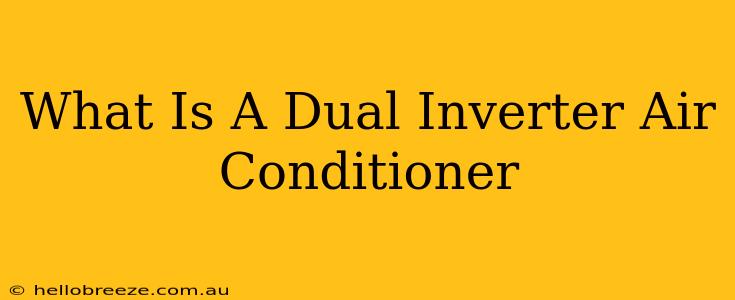Are you in the market for a new air conditioner? Choosing the right one can feel overwhelming, especially with all the different technologies available. One increasingly popular option is the dual inverter air conditioner. But what exactly is a dual inverter AC, and why is it generating so much buzz? Let's dive in.
Understanding Inverter Technology
Before we delve into dual inverters, let's first grasp the basics of inverter technology in air conditioners. Traditional non-inverter AC units operate in a simple on/off cycle. They either blast cold air at full power or shut off completely, leading to significant temperature fluctuations and increased energy consumption.
Inverter AC units, on the other hand, use a variable-speed compressor. This allows the compressor to adjust its speed based on the desired temperature, maintaining a consistent and comfortable environment. This results in:
- More precise temperature control: No more uncomfortable temperature swings.
- Energy savings: The compressor doesn't have to work as hard to maintain the temperature, leading to lower electricity bills.
- Quieter operation: The variable speed means less noise compared to traditional units.
- Longer lifespan: The smoother operation puts less stress on the compressor, extending its lifespan.
The Dual Inverter Advantage: Double the Efficiency
Now, let's get to the heart of the matter: dual inverter air conditioners. These units take the benefits of inverter technology a step further by incorporating two inverters. This seemingly small difference results in significant improvements:
- Faster Cooling: The dual inverters work in tandem to achieve the desired temperature much faster than single-inverter models. Imagine getting cool comfort quickly, especially on those scorching hot days.
- Enhanced Energy Efficiency: The dual-inverter system optimizes energy usage even more effectively than a single-inverter system, leading to potentially substantial savings on your energy bill.
- Improved Durability and Reliability: The distributed workload between two inverters reduces stress on each individual component, contributing to a longer lifespan and greater reliability.
- Superior Comfort: Maintaining a consistent temperature with minimal fluctuations translates to a more comfortable and pleasant indoor environment.
How Does it Work?
While the specifics may vary between manufacturers, the general principle is that the two inverters work together to regulate the compressor's speed and optimize the cooling process. One inverter might focus on initial rapid cooling, while the other maintains the desired temperature efficiently. This collaborative approach is key to the superior performance.
Dual Inverter vs. Single Inverter: Key Differences
| Feature | Dual Inverter AC | Single Inverter AC |
|---|---|---|
| Cooling Speed | Faster | Slower |
| Energy Efficiency | Higher | Lower |
| Durability | Generally Higher | Generally Lower |
| Noise Level | Typically Quieter | Typically Louder |
| Initial Cost | Typically Higher | Typically Lower |
Is a Dual Inverter Air Conditioner Right for You?
While dual inverter air conditioners offer significant advantages, they generally come with a higher upfront cost. However, the long-term energy savings and increased lifespan often offset this initial investment. If you prioritize energy efficiency, rapid cooling, and a quieter, more comfortable indoor environment, a dual inverter AC could be a worthwhile investment. Consider your budget, energy needs, and long-term goals when making your decision.
Remember to consider factors like:
- Room size: Choose a unit with the appropriate BTU rating for your space.
- Climate: Your local climate will affect your cooling needs.
- Features: Look for features like smart home integration, different fan speeds, and other desirable options.
By understanding the benefits of dual inverter technology, you can make a more informed decision when choosing an air conditioner that best meets your needs and budget.

